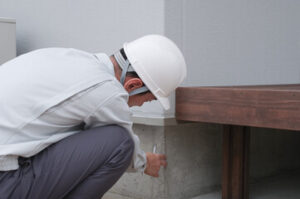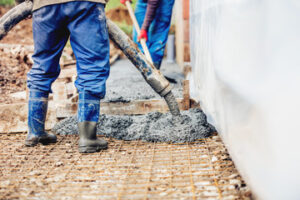Pros Foundation Repair Greensboro NC is an important investment in your home’s safety and stability. Signs that you should seek professional repairs include cracks wider than 1/4 inch and doors and windows that don’t close properly.

Your foundation repair contractor will develop a plan to identify support locations and your home’s structural needs. The process usually involves a few steps:
When homeowners see cracks in their foundation, they tend to react in one of two ways. Some panic that their house is no longer structurally sound, while others shrug them off as routine settling. Neither reaction is the right one; foundation cracks that widen or lengthen are a sign of structural problems that require immediate attention.
Hairline cracks up to 1/8 to 1/4 inch in width that run vertically or less than 45 degrees diagonally are not a concern, as long as they do not expand or get wider over time. These type of cracks are common in new homes, caused by shrinkage during the concrete curing process and normal settling. They can be easily repaired with epoxy injection, but it is important to check for moisture intrusion in these areas as well.
Cracks that are wider than 1/8 of an inch and have a stair step pattern throughout the concrete walls may indicate a more serious problem. These types of cracks are typically signs of differential settlement between different parts of the foundation or a weakness in the concrete that could lead to structural issues.
Regardless of the cause, this type of crack should be addressed immediately by professionals to ensure that moisture and pests do not infiltrate the interior of the home. Depending on the severity, these types of cracks can be repaired using internal drainage systems, carbon fiber straps and epoxy injection, or with push piers or wall anchors for lifting the affected section of the foundation.
Soil movement and expansion can also cause cracking in foundations, especially if the soil is rich in clay. As the clay swells when it is wet and contracts when it is dry, this puts pressure on the foundation walls, leading to cracking. This type of crack can be prevented by ensuring that proper drainage is used around the foundation, and by keeping the soil as dry as possible. To do this, experts dig a hole around the affected area and then install drain tile. After this, they add a layer of crushed stone, followed by a gravel base to keep water away from the foundation. Once the soil is stabilized, they fill the gap with hydraulic cement and elastomeric waterproofing tar.
Shifting Soil
Shifting soil is one of the most common foundation problems homeowners face. This problem is caused by the constant expansion and contraction of soil that supports foundations, especially if the soil was poorly compacted beneath the house when it was built. When the soil shifts, it puts pressure on the foundation and can cause cracking and sinking. Shifting soil can also lead to misaligned windows and doors that don’t open and close properly.
The constant shifting of expansive soil is exacerbated by changes in the weather. When it rains heavily, the soil becomes oversaturated with water and forms hydrostatic pressure that can push foundations upward. Similarly, when the weather is cold, the soil can shrink and pull foundations down. This can create a dangerous catch-22 where the shifting soil makes it harder for foundations to support homes, and then the shifting soil causes even more damage.
When it comes to shifting soil, the best course of action is to seek professional foundation repair as soon as possible. This will help prevent further damage and ensure the stability of the home’s structure.
Fortunately, there are many ways to fix this issue. Depending on the cause of the shift, foundation specialists may recommend solutions like underpinning, concrete leveling, or helical anchors. These methods are effective at addressing all types of settlement issues and are less invasive than other repair methods.
Another way to minimize the impact of expansive soil is to manage moisture levels around the foundation. Proper drainage is key in this process, and can be achieved by installing gutters, downspout extensions, and grading that direct rainwater away from the foundation. This helps reduce the amount of water that seeps into the basement and causes flooding, cracking, and other damage to foundations.
The most important thing for homeowners to do is be observant and pay attention to any changes in their home’s structure. If you notice cracks in the walls or floors, sagging ceilings, or gaps around windows and doors, these are all telltale signs that your foundation is struggling and needs professional help.
Uneven Floors
Uneven floors in a home can be a sign of a more serious problem with the foundation. They are a major warning sign and should never be ignored. Uneven floors can be caused by direct damage to the floor itself, sagging or sinking joists underneath the floorboards, or a number of other issues. Uneven floors can be found in the crawl space, basement, and even on the main floor of a home. Uneven floors are not only a nuisance, but they can also lead to increased maintenance costs and safety hazards for your family.
A common cause of uneven floors is excess moisture. Moisture can damage the foundation and joists in a house, which can result in sagging or sinking floors. This is often a problem in areas that have heavy rainfall or where water can freeze and expand in the winter. Excess moisture can also cause the soil to swell, which can put pressure on the foundation and shift the structure of the house.
If you have noticed your floors are sagging or feel uneven, there are several repair options available. A professional contractor can evaluate the damage to the floorboards and joists and determine what repairs are needed to fix the issue. They can then recommend the best solution for your home.
In cases where the uneven floors are due to extra moisture, a contractor can install drainage systems to reduce the amount of moisture around the foundation. They can also replace the floorboards and joists in cases where they are damaged. If the uneven floors are due to foundation settlement, a professional can install push or helical piers to lift and stabilize the foundation.
Uneven floors in a foundation are not only unsightly, but they can be very dangerous to your family. They can also lead to expensive repair bills and reduce your home value. Uneven floors should be evaluated by a professional as soon as they are noticed. If left untreated, they can lead to cracks, mold, and other structural problems. By repairing the issue early, you can avoid more serious problems in the future and save money.
Structural Damage
Structural damage is more severe than cracks and shifting soil and can lead to serious health hazards, property damage, and a decrease in your home’s value. If left untreated, structural problems can escalate to the point where your home’s walls and floors become unstable. This can also create safety issues for you and your family, posing risk for falling objects and sagging or buckling walls.
If you see signs of structural damage, it’s important to take action immediately. The longer you wait, the more severe the issue will be and the more costly it will be to repair. A qualified foundation repair specialist can use a variety of methods, including steel piers and slab jacking, to stabilize your home’s foundation. They can also use polyurethane foam to fill and seal cracks, providing an effective long-term solution.
While any type of damage can signal a problem with your foundation, the most dangerous is horizontal cracking or stair-step patterns that indicate shifting within the load-bearing walls of your home. Additionally, if the cracks appear near windows and doors or are becoming harder to open or close, this is also an indication that there’s movement in the structure.
Identifying structural damage requires regular inspections of your home by trained professionals to catch problems early and make repairs before they worsen. This includes looking for hairline cracks that don’t widen or spread, and paying attention to the alignment of doors and windows and evenness of floors. It’s also a good idea to regularly check your yard for changes, such as standing water or sloped areas that can signify settlement around your home’s foundation.
You can also reduce the risk of future foundation issues by improving your drainage system with gutters, French drains, and positive grading. Proper soil stabilization and moisture management will keep your foundation healthy and prevent the growth of tree roots that can weaken it. Finally, a thorough insurance policy that includes foundation coverage can help protect you from the financial burden of costly repairs in the event of a catastrophic failure. Contact your agent to discuss your policy and explore supplemental coverage options.
